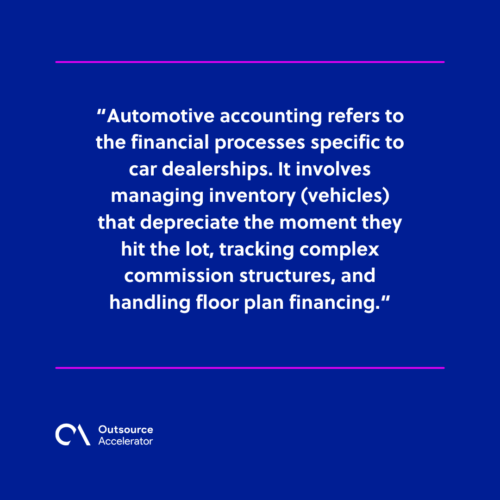A simple guide on automotive accounting for car dealerships

When running a car dealership, you can sell the best cars on the market, but if your books are a mess, you’re driving blind.
You have to know how to manage your finances properly, especially since auto dealerships on average earn $4 million in revenue and sell around 120 vehicles a year (as per ProjectionHub).
Automotive accounting is what keeps your financial engine running, whether you’re running a single dealership or managing a multi-location operation
This guide breaks it down, with real insight into how it works in practice.
What is automotive accounting?
Automotive accounting refers to the financial processes specific to car dealerships. It involves managing inventory (vehicles) that depreciate the moment they hit the lot, tracking complex commission structures, and handling floor plan financing.
What makes it different from regular accounting is the need to constantly juggle vehicle inventory, repair orders, warranty claims, and manufacturer incentives.
A wrong entry or delay in updating the books can cause ripple effects across sales, service, and finance departments.

5 main features of car dealership accounting
Automotive accounting comes with its own set of rules and quirks. Here are some core elements that make it different:
1. Inventory management. Every car on your lot is technically an asset, and tracking them accurately is crucial. You have to monitor when a car arrives, when it’s sold, and what costs are tied to it.
2. Floor plan financing. Most dealerships don’t buy cars outright. They use loans called floor plans to stock their inventory. Interest accumulates the longer a vehicle sits unsold, so accurate accounting is key to controlling costs.
3. Departmental accounting. Dealerships often split finances into separate departments: new car sales, used car sales, parts, service, and finance. Each has its own budget and profit center.
4. Commission tracking. Salespeople earn based on complex structures that may include gross profit, manufacturer bonuses, or unit volume. Accounting systems must handle these nuances accurately.
5. Manufacturer incentives. Automakers offer rebates and incentives that fluctuate. These affect profitability and need to be recorded correctly and promptly.
Essential documents for automotive accounting
The paperwork side of car dealership bookkeeping is heavy, but every document serves a purpose.
Here are some of the most important:
- Deal jackets. A complete file for each vehicle sale, containing everything from the purchase agreement to trade-in details. It ensures legal compliance and financial accuracy.
- Repair Orders (ROs). Every service visit generates an RO. It’s used to track labor, parts, and warranty claims.
- Parts invoices. Keeping parts inventory in check requires invoices that show cost, markup, and sale date.
- Daily Operating Control (DOC) reports. This snapshot shows daily performance across departments. Many dealers rely on it to make real-time business decisions.
- Bank reconciliations. Matching books to bank statements helps prevent fraud and spot errors early.
- General Ledger (GL). This is your master financial record. Every transaction flows into the GL, and it must stay clean.
- Tax records. These include payroll tax reports and income tax documentation. Accurate tax records prevent compliance issues and make audits less stressful.
6 Common challenges of automotive accounting
Automotive bookkeeping isn’t easy. Even seasoned operators hit bumps in the road. Here are some of the most common challenges that come with it:
1. High volume, low margin. Dealerships sell many units with small profit margins (only as much as 10% for new cars, according to Kruse Control). A single accounting error can wipe out a week of earnings.
2. Constant inventory turnover. Vehicles come and go fast. Lagging behind in inventory tracking leads to inaccurate cost of goods sold and skewed profit reporting.
3. Complex commission systems. Miscalculating salesperson commissions can lead to disputes and lower morale.
4. Floor plan interest accrual. Delayed payments increase interest costs. A lack of visibility in your floor plan can cost thousands.
5. Changing incentives and programs. Manufacturer programs change frequently, and misreporting these can result in lost money or audit issues.
6. Compliance Risks. Dealerships are heavily regulated. Inaccurate accounting can raise red flags with tax authorities and automotive regulators.

How a CPA helps with your automotive accounting and bookkeeping
If this all sounds overwhelming, that’s because it is. Many dealerships work with certified public accountants (CPAs) who specialize in the automotive industry.
Here’s how a good CPA can help:
- Industry expertise. You can find accountants who understand dealership accounting know-how to handle floor plans, commissions, and incentive programs.
- Financial accuracy. A CPA ensures your books are correct and up to date. This means fewer errors, smoother audits, and better decision-making.
- Regulatory compliance. From tax reporting to audit support, a certified accountant helps keep your dealership on the right side of the law.
- Cash flow insights. Understanding when and where your money is moving helps you manage floor plan costs and invest wisely in marketing or new hires.
- Profitability analysis. CPAs can break down each department’s performance so you know where to invest and where to cut.
- Time savings. Let your sales and service teams focus on what they do best. A CPA takes the financial work off your plate, reducing distractions and errors.
Automotive accounting is a tool that, when done right, helps you run a smoother, more profitable business. Understanding the fundamentals is the first step to keeping your dealership on the road to success.
It’s important to get the right people to take care of this side of the business. Whether you’re working with an in-house CPA or considering outsourcing one, accuracy, industry knowledge, and efficiency should be at the core of their service.
A qualified automotive accountant can help manage everything from inventory costing and floor plan financing to tax compliance and cash flow forecasting.
They ensure that your financial records reflect the true state of your dealership, so you can make smarter decisions, avoid costly mistakes, and stay ahead of the competition.







 Independent
Independent




